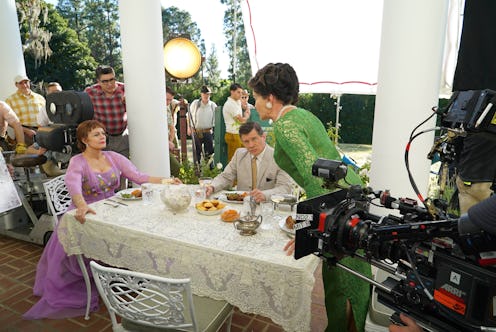
In one of the rawest moments of Feud to date, Jessica Lange's Joan Crawford lashed out at Susan Sarandon's Bette Davis since she thought she had been intentionally abandoned on the set of Hush...Hush Sweet Charlotte in the episode "Abandoned!" From this place of vulnerability and anger, Crawford and Davis were able to somehow articulate the similar and different struggles they had experienced in their careers when it came to feeling like the most beautiful actress (Crawford) or the most talented actress (Davis). Although this heated argument didn't bring this pair any closer — on the contrary, it seemed to be the final nail in the coffin of their relationship — it was a moment that showed not only why Crawford and Davis should've been allies, but also the pressures that women face to be everything to everyone.
Davis had discussed earlier in the April 16 episode how director Robert Aldrich (whom she was sleeping with in the show) didn't understand what it was like to be a woman in the entertainment industry "with the constant scrutiny and competition." While she was speaking specifically of Hollywood, I think that's a sentiment that resonates with a lot of women — regardless of their career path. She also brought up the fact that although he wasn't in the best of shape or the best looking guy around, Bob had probably never been rejected sexually by a woman. Davis credited that his success led to his sexual conquests with more attractive women — while women, even when they are powerful, are held to different standards of attractiveness than men. Davis' drunken dialogue to Bob showed that even when a woman is talented or successful that isn't enough to secure her attractiveness with the opposite sex because she sadly must also be considered sexy to be truly desirable in this world.
On the other hand, Crawford's experience was the reverse. Crawford was taking out feeling targeted and insecure on Davis during their fight on the location of Hush...Hush, Sweet Charlotte and although these feelings were making her manic, she did make a good point that Davis didn't respect the type of actress that she was. While you could blame this on how Hollywood made it seem like there was only room enough for one woman, Davis and Crawford still played into this game. Crawford had to be the beautiful one, always trying to prove she was a legitimate talent along the way. And Davis had to be the talented one, compensating for her looks by immersing herself into her roles completely and judging others who didn't do the same.
Yet, neither of them felt satisfied by the roles they were relegated to — even when they were at the top of their games. When Davis asked her, "How did it feel to be the most beautiful girl in the world?," Crawford responded, "It was wonderful. The most joyous thing you could ever imagine and it was never enough." Davis admitted that she felt the same way when it came to being perceived as "the most talented girl in the world" — it wasn't enough.
While women have always felt pressured to be beautiful and intelligent, smart and sexy, desirable and accomplished, maybe it goes back to this idea that "There can be only one" (sorry for the Highlander reference) that Hollywood perpetuated when it came to Crawford and Davis. Rather than both women being accepted for how they were, they always felt like they needed to be their best — as well as being better than the other woman. When you view life like that, being the most beautiful or the most talented won't ever make you happy and it forces women to feel like they need to be the best at everything and better than the woman next to them. And when women are inevitably unsuccessful at achieving these unattainable standards, a feeling of inadequacy and failure will follow them wherever they go, as proven by the tormented lives of Crawford and Davis in Feud.